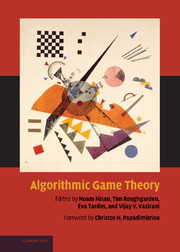Book contents
- Frontmatter
- Contents
- Foreword
- Preface
- Contributors
- I Computing in Games
- 1 Basic Solution Concepts and Computational Issues
- 2 The Complexity of Finding Nash Equilibria
- 3 Equilibrium Computation for Two-Player Games in Strategic and Extensive Form
- 4 Learning, Regret Minimization, and Equilibria
- 5 Combinatorial Algorithms for Market Equilibria
- 6 Computation of Market Equilibria by Convex Programming
- 7 Graphical Games
- 8 Cryptography and Game Theory
- II Algorithmic Mechanism Design
- III Quantifying the Inefficiency of Equilibria
- IV Additional Topics
- Index
4 - Learning, Regret Minimization, and Equilibria
from I - Computing in Games
Published online by Cambridge University Press: 31 January 2011
- Frontmatter
- Contents
- Foreword
- Preface
- Contributors
- I Computing in Games
- 1 Basic Solution Concepts and Computational Issues
- 2 The Complexity of Finding Nash Equilibria
- 3 Equilibrium Computation for Two-Player Games in Strategic and Extensive Form
- 4 Learning, Regret Minimization, and Equilibria
- 5 Combinatorial Algorithms for Market Equilibria
- 6 Computation of Market Equilibria by Convex Programming
- 7 Graphical Games
- 8 Cryptography and Game Theory
- II Algorithmic Mechanism Design
- III Quantifying the Inefficiency of Equilibria
- IV Additional Topics
- Index
Summary
Abstract
Many situations involve repeatedly making decisions in an uncertain environment: for instance, deciding what route to drive to work each day, or repeated play of a game against an opponent with an unknown strategy. In this chapter we describe learning algorithms with strong guarantees for settings of this type, along with connections to game-theoretic equilibria when all players in a system are simultaneously adapting in such a manner.
We begin by presenting algorithms for repeated play of a matrix game with the guarantee that against any opponent, they will perform nearly as well as the best fixed action in hindsight (also called the problem of combining expert advice or minimizing external regret). In a zero-sum game, such algorithms are guaranteed to approach or exceed the minimax value of the game, and even provide a simple proof of the minimax theorem. We then turn to algorithms that minimize an even stronger form of regret, known as internal or swap regret. We present a general reduction showing how to convert any algorithm for minimizing external regret to one that minimizes this stronger form of regret as well. Internal regret is important because when all players in a game minimize this stronger type of regret, the empirical distribution of play is known to converge to correlated equilibrium.
- Type
- Chapter
- Information
- Algorithmic Game Theory , pp. 79 - 102Publisher: Cambridge University PressPrint publication year: 2007
- 58
- Cited by

